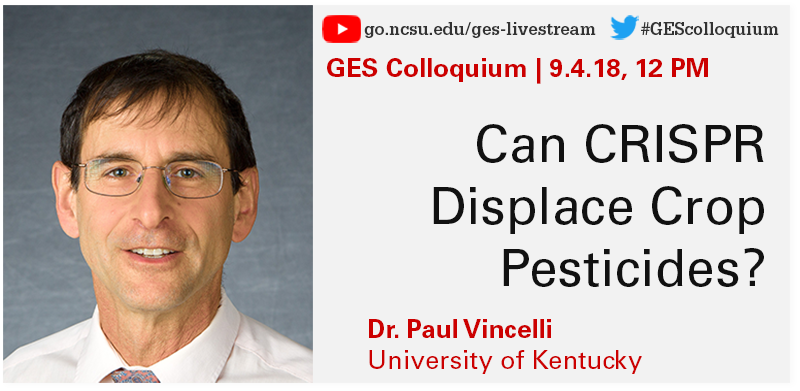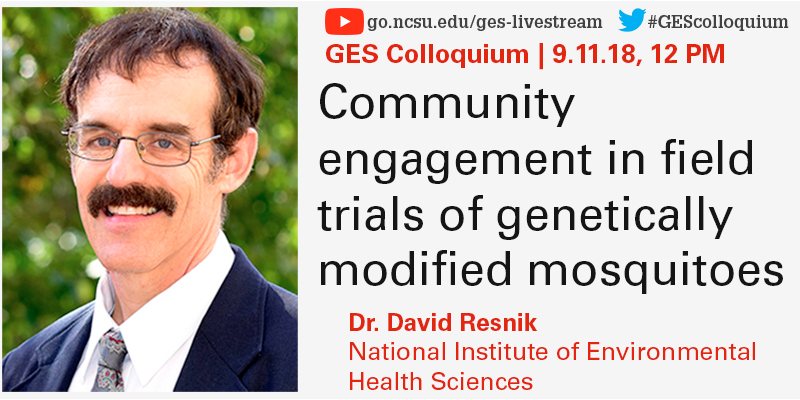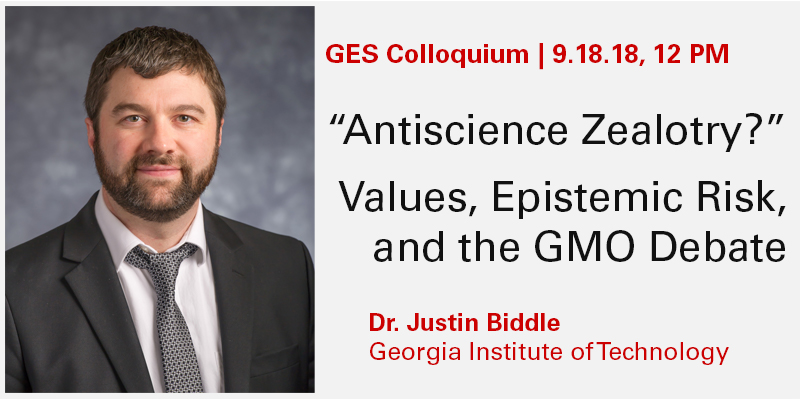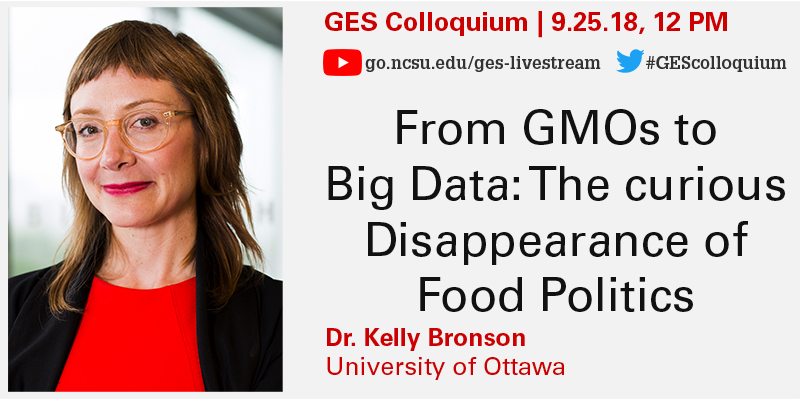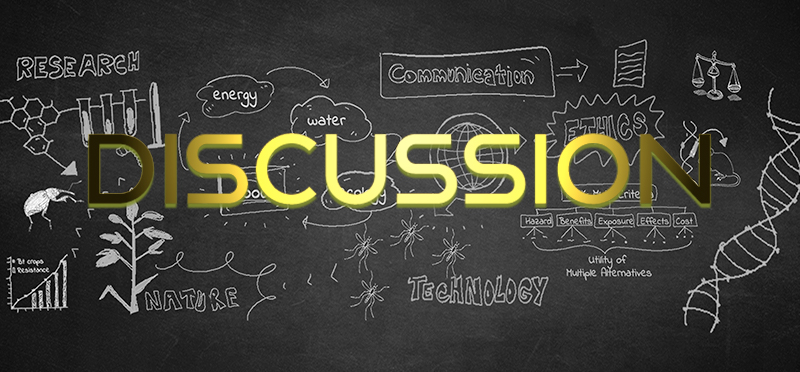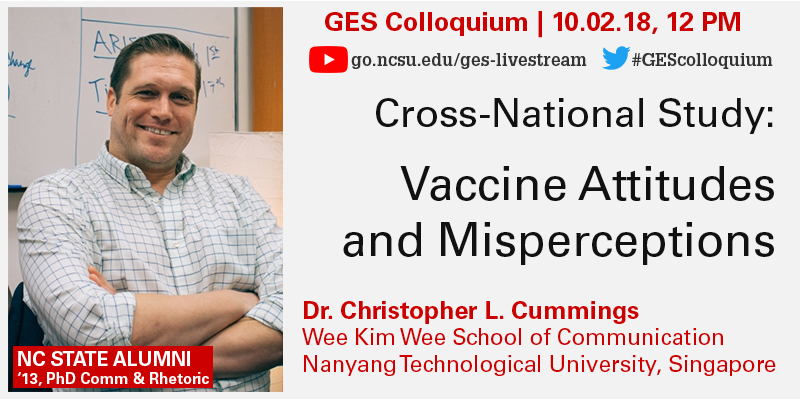Colloquium
Fred Gould speaking at World Science Festival
REWRITING LIFE: THE PROMISE AND PERIL OF EDITING YOUR DNA - Tickets availableFor the first time in history
Symposium: Forging Integrated Expertise in Graduate Education
Details available at https://ges.research.ncsu.edu/events/symposium-integrated-expertise/Live stream: https://www.youtube.com/channel/UCBi0KtRBqUbXRftnlktxj6Q/liveContact Sharon Stauffer with questions at sastauff@ncsu.edu
NASEM Webinar: Genome Editing and Security: Governance of Non-Traditional Research Communities
Register: http://nas-sites.org/dels/events/ge-security/GES Sr. Research Scholar, Dr. Todd Kuiken, and Dr. Piers Millett,Sr. Research Fellow at the Oxford Future of Humanity Institute, to discuss biosecurity and biosafety within the iGEM and DIYbio laboratory communities. Agenda:10:30 Brief Introduction...
Fall 2018 Colloquium Intro (lunch from Neomonde)
1911 Building, Room 129 (North Campus) 10 Current Dr., Raleigh, NC, United StatesOur series will kick off with a catered lunch from Neomonde on Tuesday, August 28. Come prepared to give a short update about your recent GES activities and upcoming plans.
Paul Vincelli – ‘Can CRISPR Displace Crop Pesticides?’
1911 Building, Room 129 (North Campus) 10 Current Dr., Raleigh, NC, United States9/4 GES Colloquium: We are thrilled to welcome Paul Vincelli as our first invited speaker of the semester. Paul is an extension professor at the University of Kentucky in the department of Plant Pathology, as well as co-host of the Talking Biotech podcast! He will be available to have lunch and/or meet with folks during his visit on 9/4. Request meeting with Paul >>
David Resnik – ‘Community engagement in field trials of genetically modified mosquitoes’
1911 Building, Room 129 (North Campus) 10 Current Dr., Raleigh, NC, United StatesSpeaker: David Resnik | Abstract: Effective community engagement is an important legal, ethical, and practical prerequisite for conducting field trials of genetically modified mosquitoes, because these studies can substantially impact communities and it is usually not possible to obtain informed consent from each community member.
Justin Biddle – “Antiscience Zealotry?” Values, Epistemic Risk, and the GMO Debate
1911 Building, Room 129 (North Campus) 10 Current Dr., Raleigh, NC, United StatesJustin B. Biddle is an Associate Professor in the School of Public Policy at the Georgia Institute of Technology. His research interests are interdisciplinary in nature, drawing on fields such as philosophy of science, technology, and medicine; bioethics; food studies; ethics of emerging technologies, and science and technology policy. Conceptually, his research explores the relationships between three sets of issues: (1) the role of values in science, technology, and medicine; (2) the epistemic implications of the social organization of research, and (3) ethics and policy. He has explored these relationships primarily in the areas of biomedical research and agricultural biotechnology.
Kelly Bronson – ‘From GMOs to big data: the curious disappearance of food politics’
1911 Building, Room 129 (North Campus) 10 Current Dr., Raleigh, NC, United StatesKelly Bronson, uOttawa - Abstract: Many scholars have made sense of opposition to genetically engineered (GE) organisms as contextual: these tools are judged in their historical linkages with poisonous agricultural chemicals (like dichlorodiphenyltrichloroethane/DDT), and with the corporations responsible for the production of such chemicals who now sell GE seed systems.
Colloquium Follow-up Discussion with Kelly Bronson
1214 Jordan Hall Addition 2720 Faucette Drive, Raleigh, NC, United StatesDiscussion with Kelly Bronson Follow-up discussion after Dr. Bronson's Colloquium on 9/25. Kelly Bronson will be leading a discussion of Phil Mirowski’s recent article, “The future(s) of open science” (2018). This paper will provide a...
Continue reading "Colloquium Follow-up Discussion with Kelly Bronson"
Christopher Cummings – ‘Vaccine Attitudes and Misperceptions’
1911 Building, Room 129 (North Campus) 10 Current Dr., Raleigh, NC, United States10/2 Speaker: Christopher Cummings | Abstract: "Vaccines are among the most effective disease prevention tools. Vaccines provide first-line disease prevention and are one of the most cost-effective initiatives to improve public health. While virtually all medical practitioners agree that vaccines are greatly beneficial, there are widespread reports of uncertainty and skepticism regarding vaccine efficacy, side effects, and information needs across traditional and new media. This reflects the obfuscated perspective held by many members of the public who note considerable concern when it comes to making immunization decisions. Additionally, immunization rates remain substandard for many diseases around the world and the literature investigating vaccine reluctance signals a pressing need to improve health literacies and health communication in order to dispel vaccine myths and promote immunization uptake around the world."

